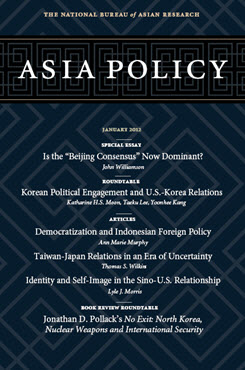Democratization and Indonesian Foreign Policy
Implications for the United States
This article examines the impact of democratization on Indonesian foreign policy and assesses its implications for U.S. interests.
EXECUTIVE SUMMARY
MAIN ARGUMENT
Indonesia’s transition to democracy has had a significant impact on its foreign policy, leading it to project a new set of values and promote a new set of interests abroad. In contrast to the Suharto era, when Indonesia based its claims to global influence largely on its leadership role in ASEAN and economic success, today the country increasingly emphasizes its credentials as the world’s third-largest democracy and home to the world’s largest community of Muslims. Indonesia’s democratization has been a key factor behind the dramatic improvement in U.S.-Indonesian relations that culminated in the signing of a Comprehensive Partnership during President Obama’s November 2010 visit to Jakarta. At the same time, democracy has opened up Indonesia’s traditionally insulated policymaking process to a new constellation of actors, many of whom advocate policies antithetical to U.S. interests. Democracy, therefore, can make it costly for Indonesian leaders to adopt policies advocated by the U.S. and has complicated the task of managing U.S.-Indonesian relations.
POLICY IMPLICATIONS
Indonesia’s adoption of a new democratic foreign policy plank creates opportunities for the U.S. and Indonesia to cooperate on democracy promotion efforts, particularly in the Middle East in the wake of the Arab Spring.
- Indonesia’s adoption of a new Islamic foreign policy plank, with the goals of playing a larger role in the global Islamic community and serving as a bridge between it and the West, is fully consistent with U.S. interests. However, greater Indonesian attention to Muslim issues, combined with U.S. support for Israel, often places the U.S. and Indonesia on opposite sides of Middle East politics.
- With virtually no Western constituency in Indonesian politics and strong anti-American sentiment, close links with the U.S. can discredit political leaders. The challenge for the U.S. is to ensure that efforts to advance its interests do not inadvertently weaken those Indonesians most amenable to U.S. interests.
About Asia Policy
Asia Policy is a peer-reviewed scholarly journal presenting policy-relevant academic research on the Asia-Pacific that draws clear and concise conclusions useful to today’s policymakers. Asia Policy is published quarterly in January, April, July, and October and accepts submissions on a rolling basis. Learn more


